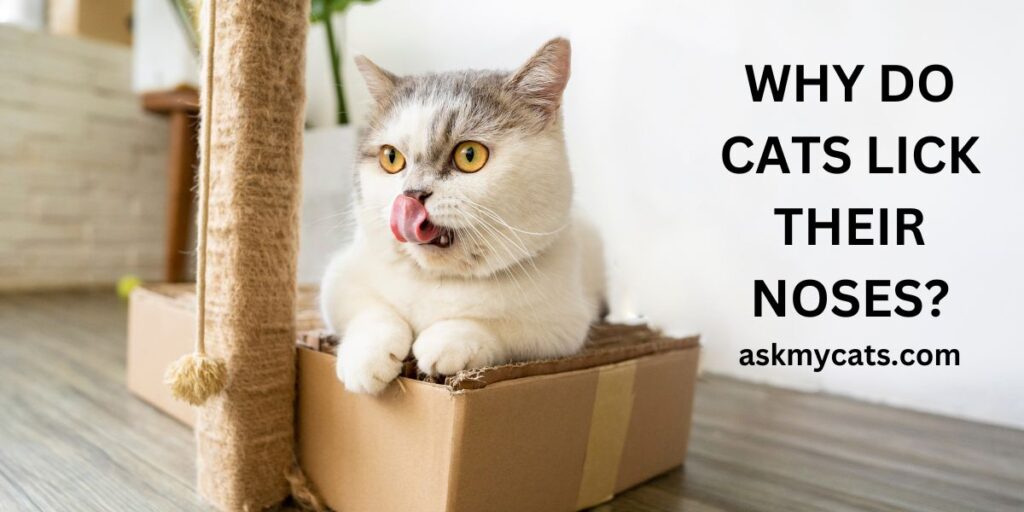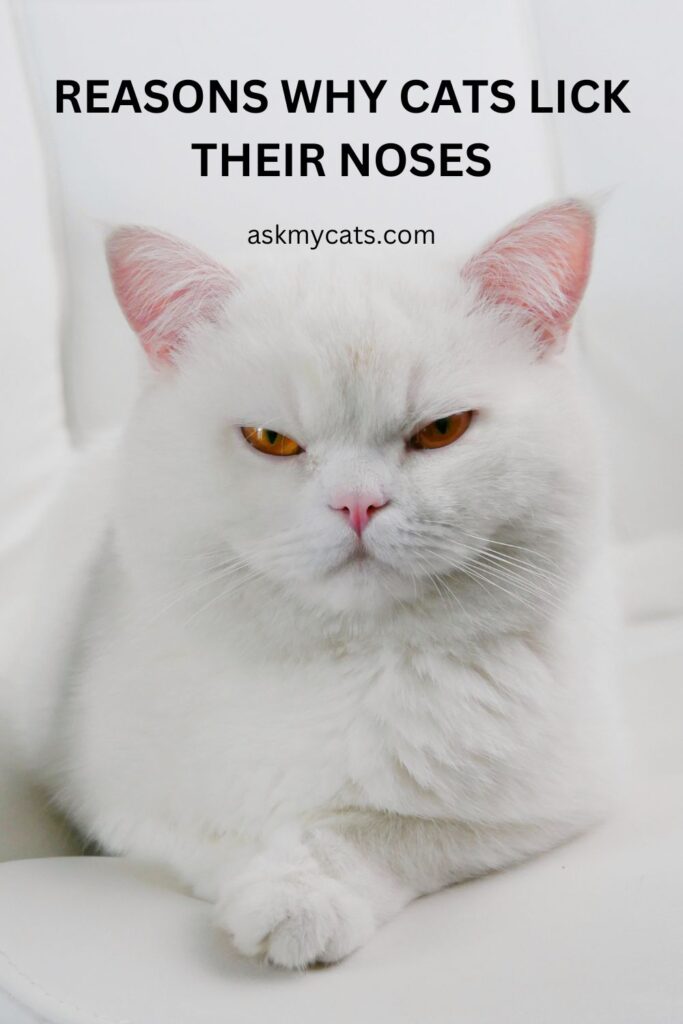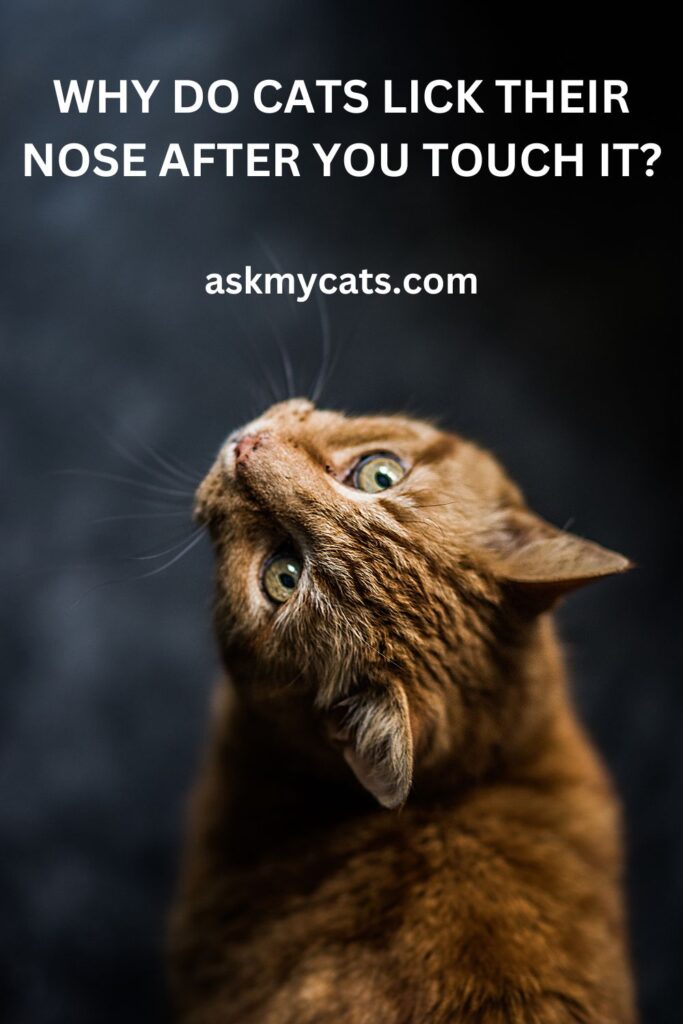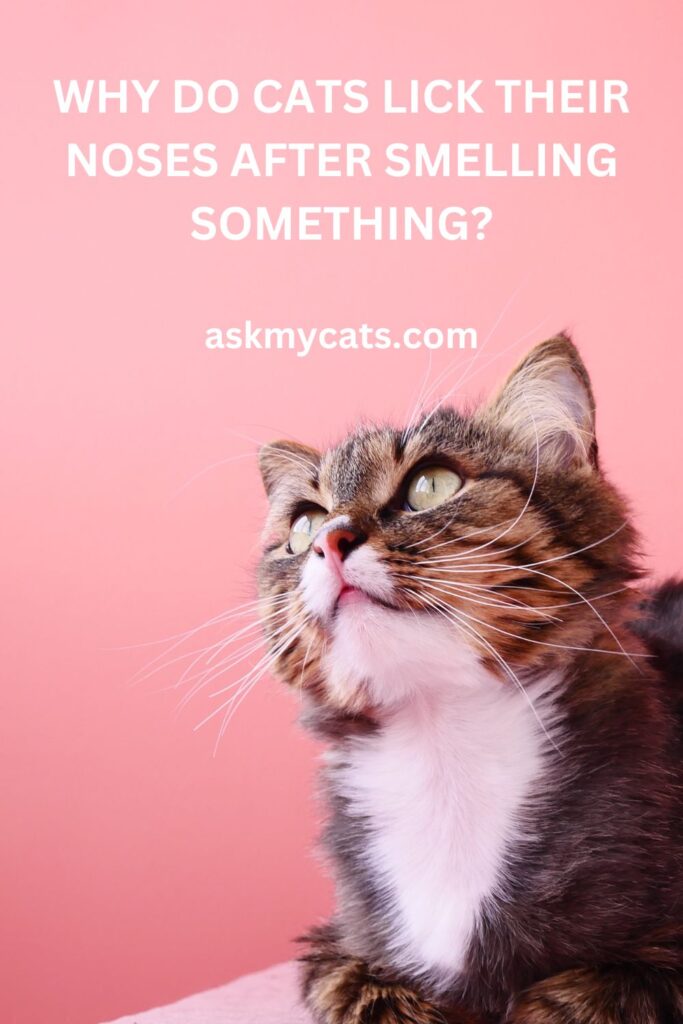Watching a cat extend its rough tongue toward its tiny pink nose can be both amusing and bewildering.
What motivates them to engage in this peculiar behavior? Is it purely a grooming ritual or does it serve a deeper purpose?
In this article, we embark on a journey to understand the reasons behind this behavior. By exploring biology, evolution, and sensory perception, we shed light on the significance of nose-licking in a cat’s daily routine.
Key Takeaways
- Cats lick their noses for various reasons, including grooming, moisturizing, temperature regulation, sensory exploration, and social/self-soothing behavior.
- When a cat licks its nose after being touched, it’s often to familiarize itself with the new scent or maintain its preferred scent profile.
- Nose-licking after smelling something helps cats gather more information about the scent, enhance their olfactory capabilities, and remove foreign scents.
- Persistent nose licking and sneezing in cats may indicate respiratory infections, allergies, foreign objects/irritants, dental/oral issues, or nasal polyps/tumors.
- Occasional nose licking is normal, but persistent or intense licking accompanied by other symptoms may require veterinary attention.
- Consulting a veterinarian can help assess the cat’s situation, perform necessary examinations or tests, and provide appropriate guidance or treatment.


Give Your Cat the Perfect Day
Get the Free Ebook!
Reasons Why Cats Lick Their Noses

Cats lick their noses for several reasons, which can be attributed to their biology, grooming instincts, and sensory perception.
Understanding these reasons can provide valuable insights into a cat’s behavior and overall well-being.
Here are some common reasons why cats engage in nose-licking:
- Grooming: Cats are meticulous groomers, and licking their noses is part of their self-care routine. By licking their noses, they can remove dirt, debris, and excess moisture, keeping their sensitive nasal passages clean and clear.
- Moisturizing: A cat’s nose contains delicate skin that can become dry or chapped. Licking their noses helps moisturize the area by spreading natural oils produced by their skin, preventing dryness and maintaining optimal hydration.
- Temperature regulation: Cats use their noses as a means to regulate body temperature. When they lick their noses, the saliva evaporates, creating a cooling effect on the skin. This behavior becomes more apparent in warm weather or during physical exertion.
- Sensory exploration: A cat’s sense of smell is highly developed, and its noses contain numerous scent receptors. Licking their noses can enhance their ability to detect and analyze scents in their environment, providing valuable information about their surroundings and potential prey.
- Social and self-soothing behavior: Cats may engage in nose-licking as a self-soothing mechanism, especially in stressful situations. Similar to how humans might engage in comforting behaviors, such as biting their nails, cats may lick their noses to relieve anxiety or establish a sense of security.
- Instinctual behavior: Nose-licking can be an instinctual behavior inherited from their wild ancestors. It may have served a functional purpose, such as aiding in hunting, grooming, or communication.
Interesting Read: Why Does My Cat Like Her Nose Touched/Rubbed?
Why Do Cats Lick Their Nose After You Touch It?

When a cat licks its nose after you touch it, it is typically a response to the unfamiliar scent that has been transferred onto its nose.
Cats have a highly developed sense of smell and rely on scent as an essential part of their communication and perception of the world around them.
Here are a few reasons why cats may lick their noses after you touch them:
- Scent recognition: Cats have scent glands located on various parts of their body, including their face and nose. When you touch a cat’s nose, you may inadvertently transfer your scent onto them. The cat may then lick its nose to analyze and familiarize itself with the new scent, helping them to identify you or any other unfamiliar scent.
- Grooming instinct: Cats are natural groomers, and licking is a part of their grooming behavior. By licking their nose after being touched, they may be instinctively trying to remove any foreign scent or residue left from your touch, maintaining their preferred scent profile.
- Comfort and self-soothing: Cats may engage in grooming behaviors, including licking their nose, as a way to self-soothe or find comfort. If they feel slightly unsettled or overstimulated by the touch, licking their nose can be a self-soothing action to calm themselves down.
- Reinforcement of territory scent: Cats have scent-marking behaviors to establish and maintain their territory. By licking their nose after you touch it, they may be reinforcing their scent and re-establishing their territory boundaries.
Interesting Read: Why Do Cats Lick Themselves After You Pet Them?
Why Do Cats Lick Their Noses After Smelling Something?

Cats lick their noses after smelling something as a way to gather more information about the scent and to further analyze it.
Here are some reasons why cats engage in nose-licking after smelling something:
- Enhancing scent reception: Cats have an incredibly keen sense of smell. When they encounter a new or intriguing scent, they may lick their noses to enhance their olfactory capabilities. Licking can help the cat’s receptors capture more scent molecules, allowing for a more thorough analysis of the smell.
- Sensory exploration: Nose-licking is part of a cat’s sensory exploration process. By licking their noses after smelling something, they can gather additional information about the scent, its intensity, and potentially its source. This behavior aids in their understanding of their environment and the various scents present.
- Removing foreign scents: Cats have a strong preference for familiar scents, especially those associated with their territory or individuals they trust. If they encounter an unfamiliar or unpleasant smell, they may lick their noses to remove or diminish the presence of the foreign scent. This behavior helps them maintain a scent profile that is comforting and familiar to them.
- Grooming response: Nose-licking is part of a cat’s grooming routine, and it can be triggered by the presence of a new scent. Cats may engage in grooming behaviors, including licking their noses, as a way to maintain cleanliness and remove any residue that may have been picked up while investigating the scent.
Interesting Read: Why Do Cat’s Noses Get Wet When They Purr?
Why Does My Cat Keep Licking His Nose And Sneezing?
If your cat is continuously licking their nose and sneezing, it could indicate a few potential issues that may require veterinary attention.
Here are some possible reasons for your cat’s behavior:
- Respiratory infection: Cats can develop respiratory infections, such as upper respiratory tract infections or feline viral rhinotracheitis. These infections can cause nasal congestion, irritation, and sneezing. Excessive nose licking may be an attempt to alleviate discomfort or clear the nasal passages.
- Allergies: Cats can be allergic to various substances, including pollen, dust mites, or certain foods. Allergies can cause nasal congestion, itching, and sneezing. Licking the nose excessively may be a response to the itchiness or irritation caused by the allergen.
- Foreign object or irritant: Your cat may have come into contact with a foreign object or irritant that is causing nasal irritation. Licking the nose could be an instinctive response to alleviate discomfort or remove the irritant.
- Dental or oral issues: Dental problems, such as tooth decay or gum disease, can lead to nasal discomfort or inflammation. Cats may lick their noses and exhibit sneezing as a result of the associated discomfort or pain.
- Nasal polyps or tumors: In rare cases, the presence of nasal polyps or tumors can cause persistent licking of the nose and sneezing. These growths can irritate the nasal passages and lead to symptoms such as nasal discharge and difficulty breathing.
It’s important to have your cat examined by a veterinarian if you notice these symptoms.
Interesting Read: Why Do Cats Have Wet Noses?
Should You Worry About Your Cat Licking His Nose?
In general, occasional nose licking in cats is considered a normal behavior and is typically not a cause for concern. However, if you notice your cat persistently or excessively licking its nose, it may indicate an underlying issue that requires attention.
Pay attention to the frequency and intensity of the licking. Occasional, brief nose licking is usually not worrisome, but if it becomes frequent, intense, or interferes with your cat’s normal activities, it could be a sign of discomfort or an underlying health problem.
Take note of any other symptoms your cat may be exhibiting, such as excessive sneezing, nasal discharge, coughing, difficulty breathing, loss of appetite, or changes in behavior.
If these symptoms are present along with the nose licking, it’s advisable to consult a veterinarian.
Additionally, consider the duration and progression of the behavior. If the nose licking persists for an extended period or worsens over time, veterinary attention is recommended.
It’s also important to consider your cat’s overall health and well-being. If your cat appears otherwise healthy, eats well, and has normal energy levels, the nose licking may be less concerning.
However, if your cat seems unwell, experiences weight loss, or displays other signs of illness, it’s crucial to seek veterinary advice.
Consulting a veterinarian can help assess your cat’s specific situation, perform necessary examinations or tests, and provide appropriate guidance or treatment. Early detection and intervention can help address any underlying issues and ensure your cat’s well-being.
Frequently Asked Questions
Should I be concerned if my cat sneezes while licking their nose?
Occasional sneezing during nose licking is usually not a cause for concern. However, if the sneezing is frequent, accompanied by other symptoms, or becomes persistent, it may indicate a respiratory infection or other health issue requiring veterinary attention.
Can allergies cause cats to lick their noses excessively?
Yes, allergies can lead to excessive nose licking in cats. Allergies to environmental factors, such as pollen or dust mites, can cause nasal irritation and itching, prompting cats to lick their noses to alleviate discomfort.
When should I seek veterinary advice for my cat’s nose licking?
If your cat’s nose licking is persistent, excessive, or accompanied by other concerning symptoms, or if you’re unsure about its underlying cause, it is advisable to consult a veterinarian. They can evaluate your cat’s condition, perform necessary tests, and provide appropriate guidance or treatment.
Final Words
Cats licking their noses can serve various purposes, including grooming, sensory exploration, and maintaining their preferred scent profile.
It is generally considered a normal behavior unless it becomes excessive, interferes with their daily activities, or is accompanied by other concerning symptoms.
Interesting Read: Why Does My Cat Nose Bump Me?
